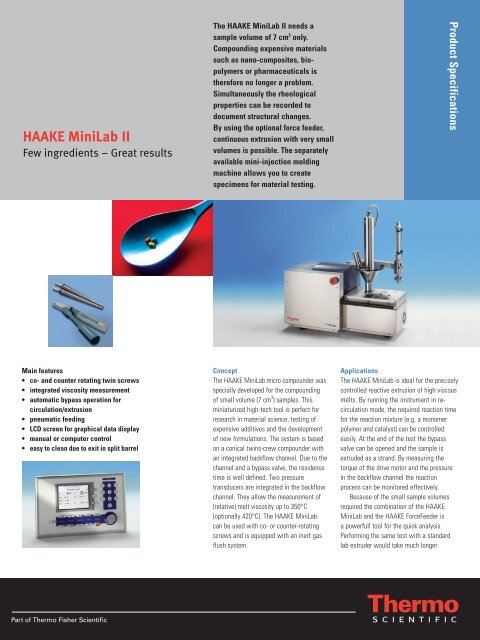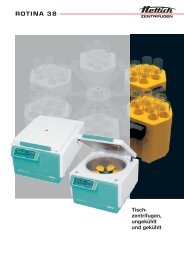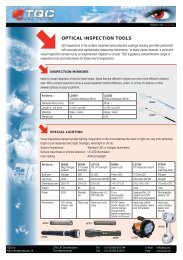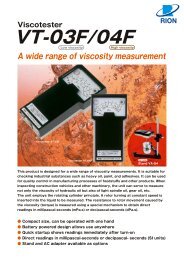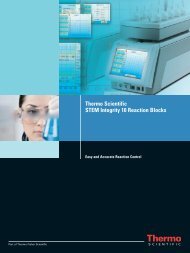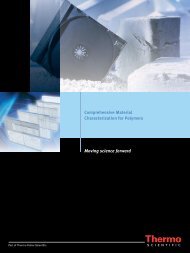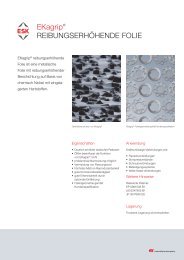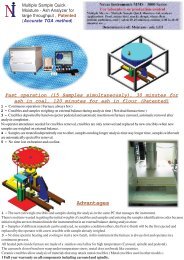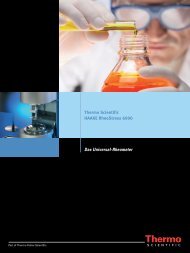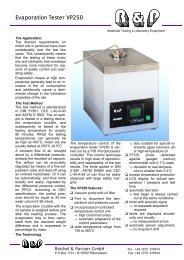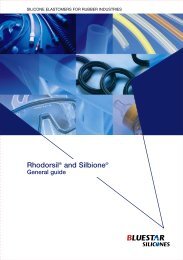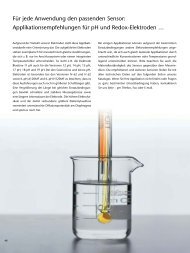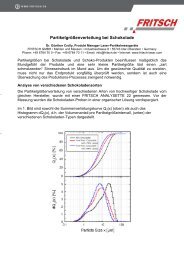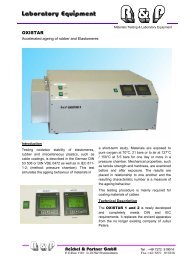Create successful ePaper yourself
Turn your PDF publications into a flip-book with our unique Google optimized e-Paper software.
<strong>HAAKE</strong> <strong>MiniLab</strong> <strong>II</strong><br />
Few ingredients – Great results<br />
Main features<br />
co- and counter rotating twin screws<br />
integrated viscosity measurement<br />
automatic bypass operation for<br />
circulation/extrusion<br />
pneumatic feeding<br />
LCD screen for graphical data display<br />
manual or computer control<br />
easy to clean due to exit in split barrel<br />
The <strong>HAAKE</strong> <strong>MiniLab</strong> <strong>II</strong> needs a<br />
sample volume of 7 cm 3 only.<br />
Compounding expensive materials<br />
such as nano-composites, biopolymers<br />
or pharmaceuticals is<br />
therefore no longer a problem.<br />
Simultaneously the rheological<br />
properties can be recorded to<br />
document structural changes.<br />
By using the optional force feeder,<br />
continuous extrusion with very small<br />
volumes is possible. The separately<br />
available mini-injection molding<br />
machine allows you to create<br />
specimens for material testing.<br />
Concept<br />
The <strong>HAAKE</strong> <strong>MiniLab</strong> micro compounder was<br />
specially developed for the compounding<br />
of small volume (7 cm 3 ) samples. This<br />
miniaturized high-tech tool is perfect for<br />
research in material science, testing of<br />
expensive additives and the development<br />
of new formulations. The system is based<br />
on a conical twins-crew compounder with<br />
an integrated backflow channel. Due to the<br />
channel and a bypass valve, the residence<br />
time is well defined. Two pressure<br />
transducers are integrated in the backflow<br />
channel. They allow the measurement of<br />
(relative) melt viscosity up to 350°C<br />
(optionally 420°C). The <strong>HAAKE</strong> <strong>MiniLab</strong><br />
can be used with co- or counter-rotating<br />
screws and is equipped with an inert gas<br />
flush system.<br />
Product Specifications<br />
Applications<br />
The <strong>HAAKE</strong> <strong>MiniLab</strong> is ideal for the precisely<br />
controlled reactive extrusion of high viscous<br />
melts. By running the instrument in recirculation<br />
mode, the required reaction time<br />
for the reaction mixture (e.g. a monomer<br />
polymer and catalyst) can be controlled<br />
easily. At the end of the test the bypass<br />
valve can be opened and the sample is<br />
extruded as a strand. By measuring the<br />
torque of the drive motor and the pressure<br />
in the backflow channel the reaction<br />
process can be moni tored effectively.<br />
Because of the small sample volumes<br />
required the combination of the <strong>HAAKE</strong><br />
<strong>MiniLab</strong> and the <strong>HAAKE</strong> ForceFeeder is<br />
a powerfull tool for the quick analysis.<br />
Performing the same test with a standard<br />
lab extruder would take much longer.
Thermo Fisher Scientific<br />
Process Instruments<br />
International/Germany<br />
Dieselstr. 4<br />
76227 Karlsruhe<br />
Tel. +49 (0) 721 4 09 44 44<br />
info.mc.de@thermo.com<br />
www.thermo.com/mc<br />
<strong>HAAKE</strong> <strong>MiniLab</strong> <strong>II</strong> Micro Compounder<br />
Feeding systems<br />
Three different feeding systems are<br />
available for the <strong>HAAKE</strong> <strong>MiniLab</strong>: A<br />
pneumatic feeding system comes as<br />
standard equipment, optionally a manual<br />
feeder and the new <strong>HAAKE</strong> Force Feeder<br />
are available. This new Feeder is specially<br />
designed for the <strong>HAAKE</strong> <strong>MiniLab</strong> to enable<br />
continuous sample feeding (max. pellet<br />
size 2 mm). With an attached rod or slit die<br />
the constant production of small strands or<br />
bands is possible. The cooled feeding zone<br />
avoids the melting of material in the feeder<br />
funnel. For sensitive samples the sealed<br />
funnel can be purged with inert gas.<br />
Output rates are possible in the range of<br />
2 g of material per minute.<br />
Benelux<br />
Tel. +31 (0) 76 5 87 98 88<br />
info.mc.nl@thermo.com<br />
China<br />
Tel. +86 (21) 68 65 45 88<br />
info.china@thermo.com<br />
1 Union nut<br />
2 Hopper<br />
3 Filling shaft<br />
4 Inspection<br />
glass<br />
5 Motor console<br />
France<br />
Tel. +33 (0) 1 60 92 48 00<br />
info.mc.fr@thermo.com<br />
India<br />
Tel. +91 (20) 66 01 12 45<br />
info.pid.in@thermo.com<br />
6 Forcing screw<br />
7 Index bolt<br />
8 Switching box<br />
9 Knurled nut<br />
10 Protection cap<br />
Application example: Drop of the melt viscosity due to the degradation of the polymer at long residence time<br />
Technical specifi cations<br />
Drive<br />
Motor power 400 W<br />
Speed range 1 … 360 min-1 Max. torque 5 Nm per screw<br />
Power supply 230 V ± 10 %, 50/60 Hz<br />
115 V ± 10 %, 60 Hz<br />
<strong>HAAKE</strong> Force Feeder<br />
Max. torque 4 Nm<br />
Max. Speed 30 min-1 Material stainless steel 1.4122 Cr coated<br />
Power supply 230 V ± 10 %, 50/60 Hz<br />
115 V ± 10 %, 60 Hz<br />
United Kingdom<br />
Tel. +44 (0) 1785 81 36 48<br />
info.mc.uk@thermo.com<br />
USA<br />
Tel. 603 436 9444<br />
info.mc.us@thermo.com<br />
Instrument control<br />
The <strong>HAAKE</strong> <strong>MiniLab</strong> can be controlled by using<br />
the separate manual control box which includes<br />
a LCD screen for graphical data dis play or using<br />
the versatile application software.<br />
The manual control box features:<br />
easy handling with a clear menu structure<br />
numerical and graphical data monitoring<br />
storage of up to 10 test setups<br />
flexible positioning of the display<br />
Software<br />
The application software features:<br />
Instrument control via standardized<br />
RS232 interface<br />
storage of test setup and test results<br />
in one file<br />
flexible data documentation<br />
advanced evaluation methods and<br />
documentation of rheological data<br />
(viscosity, shear stress).<br />
Extruder<br />
Design conical co & counter rotating<br />
Temperature 350 °C or 420 °C as option<br />
Barrel stainless steel (HRC55) additional standard sensor port (optional)<br />
Screws stainless steel 1.4122<br />
Cooling air / water for 350 °C version, air for 420 °C version<br />
Pressure up to 200 bar<br />
Volume 7 cm 3 (equivalent to 5 g PE)<br />
Bypass automatic<br />
Feeding pneumatic ram (standard)<br />
manual feeding (optional)<br />
force feeder (optional)<br />
© 2006/12 Thermo Fisher Scientific· All rights reserved · 623-3035 · PS623305v2.0E12/06MC · This document is for informational purposes only and is subject to change without notice.


